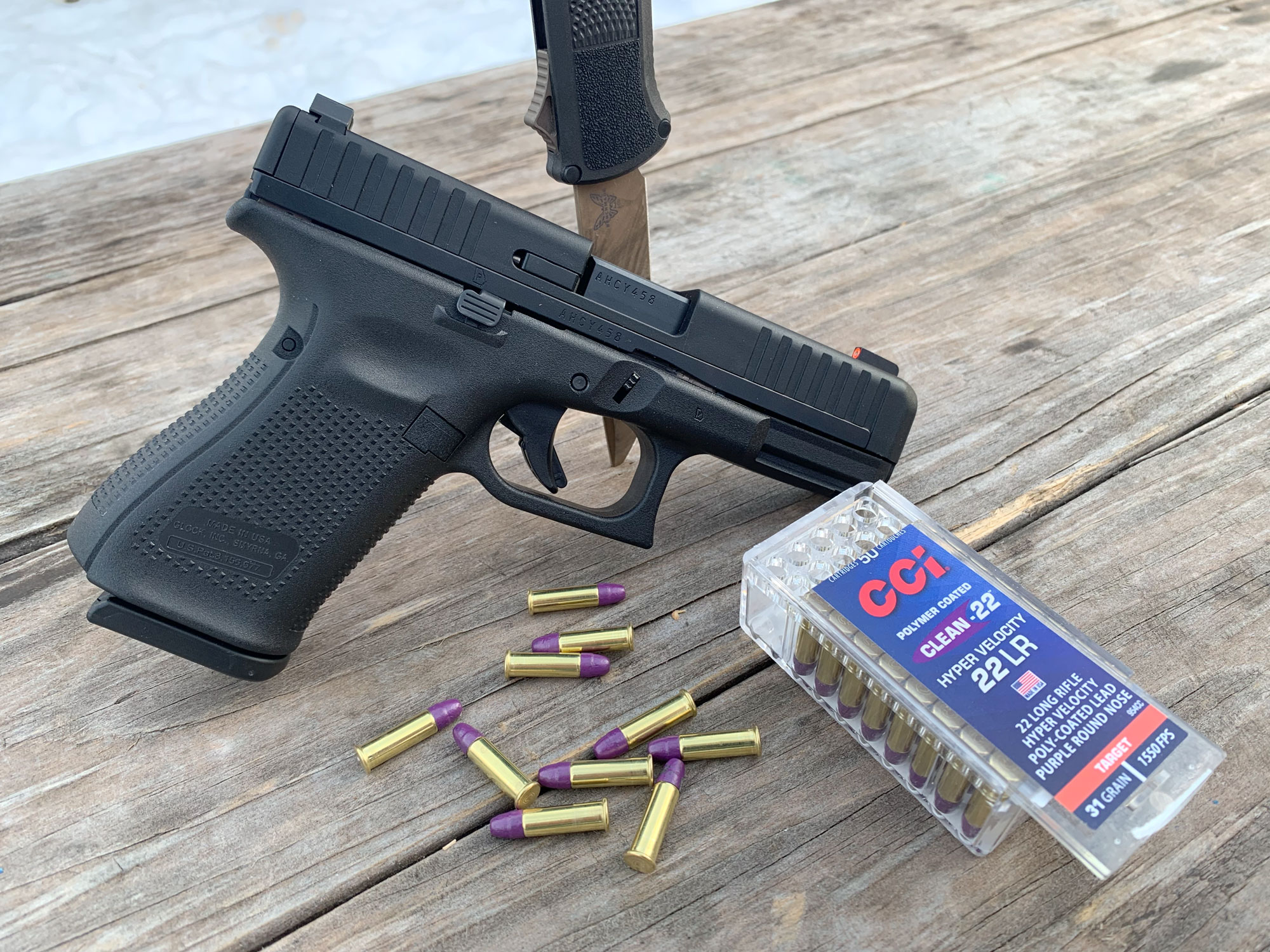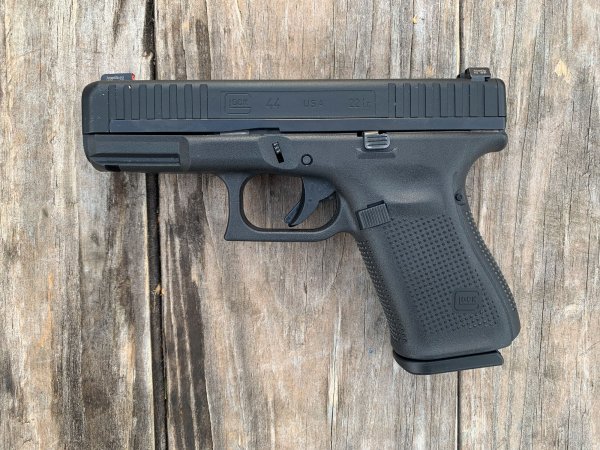We may earn revenue from the products available on this page and participate in affiliate programs. Learn More ›
Until the recent release of the Glock 44, the Austrian juggernaut of the pistol world didn’t have a .22 rimfire in its lineup. Glock has been a driving force in the handgun market for decades, and fans of their polymer-framed pistols rejoiced when the G44 arrived. The relatively stale .22 pistol category has seen some innovation in recent years, and this new Glock is certainly one of the highlights. What should we make of it though? We expect it to be simple and reliable like any other Glock, but how might it distinguish itself from other new plinkers, trainers, and pint-sized pistols? I got a Glock 44 for myself to find out.
Glock 44 Specs
- Caliber: .22 LR
- Capacity: 10 rounds
- Magazine: Polymer, single-stack
- Dimensions: 5.04 inches (H) x 7.28 inches (L) x 1.26 inches (W)
- Weight: 15 ounces (weighed with empty magazine)
- Frame: Polymer with steel slide rails
- Slide: Steel, black finish
- Barrel: 4.02-inches, black finish
- Sights: Metal Ameriglo 3-dot tritium or White 3-dot with adjustable rear sight
- Optic ready: No
- Trigger: Single-action, curved shoe, 6 pounds 8 ounces (measured)
- Safety: Trigger safety bar
- Price: $360
Review Highlights
- True-to-form Glock design
- Comparable in size and trigger pull to G19
- Available with Ameriglo sights
- Picky about some ammo
- Accuracy average: 2.69 inches (12 5-shot groups from 15 yards)
The Glock 44, Glock’s first .22 LR
Any new Glock introduction is usually received in predictable fashion: Glock fans recognize updates and changes within the scope of Glock pistols — and are generally excited. Shooters that aren’t Glock fans usually roll their eyes — ooh, another Glock. Most new introductions aren’t dramatically different from other Glocks, but that’s not a bad thing. Glock has built a reputation for simple, durable, and utterly reliable pistols. That’s why we like them, and that’s what we want.
A Genuine Glock
The 44th model that Glock introduced, the .22 LR Glock 44 is one of the most true-to-form .22 pistols on the market. By that, I mean that in construction, it more closely follows the design of its centerfire counterparts than any other .22 pistol I’ve used.
Model-mimicking .22 pistols are nothing new. The Ruger 22/45 is one of the most notable .22 pistols that took on the grip shape and angle of the 1911 in .45 ACP. The purpose was to accommodate 1911 shooters with a rimfire pistol that would feel and point like their .45s. Later, we saw — and continue to see full-sized 1911/.22 pistols that are the size of a centerfire 1911, but chambered in .22LR. Mostly, these guns are 1911 in looks only and employ a fixed barrel. The only exception I’ve seen is Browning’s scaled-down 1911/22 pistols, which do have a miniaturized 1911 barrel, guide rod, and the like. Even Sig’s popular P322 features a fixed barrel that deviates from the designs of their P320 and P365 pistols.

The Glock 44 is Glock inside and out. It’s virtually identical in size to the G19, and has a grip and slide serrations that are consistent with the Gen 5. The pistol uses the same dual takedown levers and field-stripping procedure as every other pistol in their lineup.
Under the hood, you’ll notice that the Glock 44 uses the same style guide rod and captive recoil spring as their other pistols, and the non-fixed barrel is removed from the slide in the same way. The barrel has a long feed ramp to guide cartridges up from the magazine, and it’s not threaded.
The grip and frame look so much like the G19 that you’d think you could swap them (you can’t, I tried). To reduce the mass of the slide, the whole top of the slide is polymer, with a smaller steel portion that includes the striker assembly and slide rail grooves. Magazines are about the same size as G19 mags, but are single-stack and hold 10 rounds — my only complaint about them is that they aren’t higher capacity. They have loading tabs on either side of the magazine to compress the spring, and they’re easy to load.

A Glock is a Glock
A Glock is anything but flashy, so if you’re familiar with them, you already know what you’re getting in the Glock 44. In Gen 5 configuration, the polymer frame has no finger grooves, but does include additional backstraps of varying thickness to customize your grip. The magazine catch is reversible and the pistol features ambidextrous slide stop levers. The G44 has the same single-slot accessory rail that you’ll see on the G19, and a virtually identical trigger pull weight and feel.

The Glock 44 comes standard with polymer sights — the standard white front dot and square “U” notch rear — but the rear sight is actually adjustable. My model came with Ameriglo H3 3-dot night sights — a daring foray for factory Glock pistols. Since the first thing I do on any Glock pistol I buy is replace the factory sights, this is a model variation that I celebrate.
The Glock G44 doesn’t incorporate the MOS system or other standard optics compatibility currently, which is a little disappointing.
Shooting the Glock 44
I fired over 500 rounds through the Glock 44 and with certain types of ammunition, it’s quite reliable. With others — not so much. This is an issue that is common with most .22 pistols, and says more about the variability and sloppy nature of .22 ammo than about the gun itself. Varying bullet dimensions and lubricants can cause malfunctions, especially in a more complex gun like the Glock 44. Standard .22 pistols like the Ruger Mark IV also have feed ramps, but their magazines position the nose of the bullet right at the opening of the chamber. The Glock 44’s magazine positions the bullet farther back, and it’s just connecting with the feed ramp as it springs free from the feed lips. This seems to create a bit more room for error.
The trigger on the G44 feels nearly identical to my stock G19 trigger. I didn’t tear the trigger down to component level, but on the range, it was hard to tell the difference. This makes it quite appealing for a training gun. Switching back and forth between guns with different-feeling triggers can cause some problems. Loading magazines into the gun is also a good simulation of the same process with a G19, but the .22 LR magazines of the G44 do lock into place with less force and spring freely when released. Because the magazines and mag well are the same size as a G19, it’s good practice.
Some bulk-box bullets that used longer hollow points would occasionally jam on the feed ramp and edge of the chamber, smashing the bullet. Lower-powered ammunition also struggled to cycle the Glock 44. Subsonic loads would often not eject, with the empty case staying in the chamber or stovepiping between the barrel and slide. The pistol functioned best with high velocity loads using shorter bullets. CCI .22 Clean was a clear winner in my G44. It cycled the pistol sharply and I never had any feeding malfunctions with it. This hyper-velocity ammo fires a 31-grain polymer-coated bullet at 1,550 fps, and produces a substantial flash when fired in the Glock 44.
Glock 44 Accuracy
To test the G44’s accuracy, I recorded four 5-shot groups with three different types of ammo: CCI Standard Velocity Target, CCI Clean .22, and Winchester Super X 40-grain Power Point. I followed our handgun accuracy protocol of shooting from 15 yards, standing, using a bagged tripod for support. The Glock 44 averaged 2.69-inch groups across all ammo types, and the CCI Standard Velocity and .22 Clean averaged 2.39 and 2.40 inches respectively. This is pretty good accuracy for a non-target .22 pistol with open sights.
I did find that the iron sights were not quite zeroed, so I used my XS Glock Sight tool to precisely slide the rear sight and zero the gun. I would like to see this pistol with an optic-mounting option, as it’s become standard — even for Glocks — and allows a greater level of precision and speed.

FAQ
The Glock 44 provides shooters who prefer a pistol chambered in .22 LR that is the same size as a glock G19 9mm centerfire, making it more affordable to shoot and train with.
Yes, externally, the Glock 44 is the same size as the Glock G19, but it weighs less.
The Glock 44 will jam with some types of .22 LR ammo, so it’s not as universally reliable as the centerfire models. However, with the right kind of ammo, it does not commonly jam.
What the Glock G44 Does Well
The Glock 44 makes an excellent trainer or plinker for those who prefer Glock pistols. It’s reliable with the right kind of ammunition, and pretty accurate. It’s great for simulating the handling and shooting characteristics of the G19.
Where the Glock 44 Could Be Better
The only significant improvements I could see helping the Glock 44 would be optics compatibility and a double-stack magazine. Other companies have cracked the code on reliable-running double-stack .22 LR magazines, Glock should do it too.
Final Thoughts on the Glock 44
The Glock G44 is a well-executed pistol that the market really needed. Understandably, it seems like just another Glock to those who prefer other brands, but considering the tremendous popularity of the G-series pistols, a .22 LR model is nothing short of mandatory. I’m quite pleased with the whole package, though they would do well to add models that are optic-compatible and expand the capacity of those magazines.


